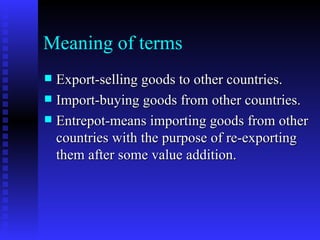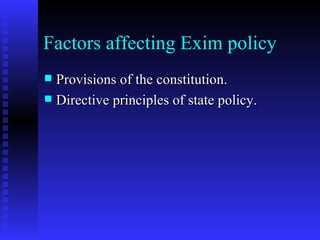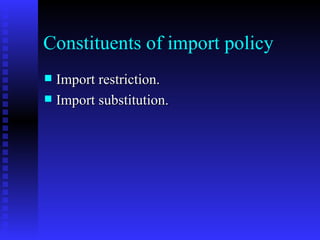Exim policy
- 1. Meaning of terms Export-selling goods to other countries. Import-buying goods from other countries. Entrepot-means importing goods from other countries with the purpose of re-exporting them after some value addition.
- 2. Factors affecting Exim policy Provisions of the constitution. Directive principles of state policy.
- 3. Trade policy before 1985 Restrictive import policy(1951-52). Liberalisation measures to build foreign reserves,meet shortage of certain goods,to make a mark in foreign market,etc(1951-57) Rigorous import policy to reduce foreign debt;vigorous export promotion to bring more foreign currency(1957-1966). Devaluation of rupee to check imports and boost exports(1966-76). Policy of import liberalisation to indirectly promote exports(after 1976).
- 4. Need of policy Complete or partial ban on the import of consumer goods. Extensive control of various items of imports. Liberal imports of capital goods for industrialisation. Developing a suitable environment for adopting import substitution. The duty drawback system i.e. reimbursement of tarrif paid on imported material and excise duties paid on inputs to the exporters. Market development assistance I.e providing cash compensatory support to exporters and providing grant in aid to export promotion councils and other organisations for exploring new export markets. Fiscal concessions for exports such as exempting export earnings from income tax partially or fully. Import policy for exports I.e. providing import inputs to export sector at international prices. Developing export processing Zones(EPZ) and 100 percent export-oriented units. (EOUs) for providing necessary open environment for export production.
- 5. Constituents of import policy Import restriction. Import substitution.
- 6. New Exim policy Introduction of major change in the import licensing system . Strengthened the system of advance license provided to exporters with duty free access to inputs. Import of capital goods procedure was simplified,duty reduced to 10% from 15%. List of restricted items was reviewed & many items were shifted to limited permissible limit It permitted export houses,trading houses & state trading houses to import a wide range of items. Export processing zones & 100% export oriented units were granted many concessions. The eligibility for recognition as export/trading house/star trading house & super star trading house from 10 crores,15 crores,250 crores & 750 crores to 20,100,500 & 1500 crores respectively
- 7. Relevant Exim Policy of the current year to be studied.






